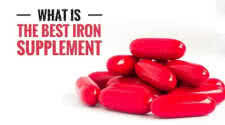Supplementing with Iron - Is Iron Important for Sports Athletes?

There are many natural and effective supplements
Iron plays a major role in physiological processes, many of which are important for muscle growth. However, supplementation is needed only if you have below-normal iron levels in your blood or have abnormal
hemoglobin status. If you're excessively fatigued, train frequently and aren't eating a sound diet, consider asking your doctor to check your blood. That's the only way to confirm an iron deficiency.
Iron is widely distributed in food and is found in two forms: heme & nonheme. Heme iron is obtained by eating beef, fish and poultry. Nonheme iron is found in plant foods like nuts, fruits, vegetables,
grains, and also in animal sources. In addition to the foods mentioned above, several commercial items, such as boxed cereals, flour and many macaroni products, are fortified with this important mineral.
Iron is a major component of hemoglobin (red blood cells) and myoglobin (an oxygen-carrying protein found in muscle). It allows the transport of oxygen to tissues, the temporary storage of oxygen within
tissues, and it assists in the transport of electrons through the chain of oxidative reactions that helps produce adenosine triphosphate (ATP). All of these processes are essential for life and for optimal
muscle function.
Epidemiological studies (research using large populations) on athletes have shown iron deficiency and abnormal hemoglobin levels to be rare. Little attention has been paid to bodybuilders regarding this
question. However, iron deficiency has never been demonstrated to be a problem among them, presumably because bodybuilders consume large amounts of iron-rich meat. Those most likely to have problems in this
area, due to very stressful training programs and poor dietary habits, are female endurance athletes such as cross country runners and marathoners. The menstrual cycle may also play a role.
If you follow the nutrition advice in fitFLEX, you should be getting plenty of iron. Make sure to eat plenty of lean protein sources, like beef, for heme iron and plenty of leafy green vegetables for
nonheme.
If you want to supplement, a multivitamin / mineral is the way to go. They're cheap and cover all bases in case your food intake is lacking. It will also cover you if your body is needy for more of a certain
nutrient due to training-induced stress. As far as going above the recommended daily allowance for iron (12 milligrams [mg] for teenage males, 15 mg for adult females and 10 mg for adult males), I wouldn't
recommend it. High dosages of iron can be toxic and offer no performance-enhancing effects.